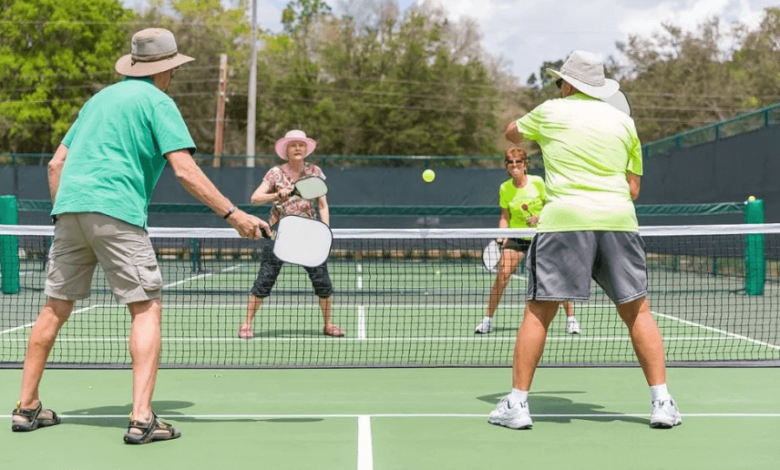Staying Safe on the Court: Pickleball Tips for Seniors

Pickleball has quickly become a favorite pastime for many seniors across the country. With its simple rules, smaller court size, and social atmosphere, it offers a fun and engaging way to stay active. But like any physical activity, especially as we age, it’s important to prioritize safety. Whether you’re just starting out or are a seasoned player, here are essential tips to help you stay safe on the court and enjoy pickleball for years to come.
1. Warm Up and Stretch
One of the most overlooked aspects of injury prevention is warming up. Before jumping into a game, spend at least 5–10 minutes doing light cardio like walking or slow jogging. Follow it up with dynamic stretching that focuses on your shoulders, arms, hips, and legs. This helps increase blood flow, improve flexibility, and reduce the risk of strains or sprains during play.
2. Wear Proper Footwear
Footwear plays a crucial role in balance and joint protection. Choose court shoes specifically designed for lateral movement. Avoid running shoes, which are made for forward motion and can increase the chance of tripping or rolling an ankle. Look for shoes with good grip, cushioning, and ankle support to reduce impact and prevent falls.
3. Use the Right Equipment
Pickleball paddles come in a variety of materials and weights. Lightweight paddles can reduce arm fatigue and are easier on the joints, particularly for seniors with arthritis or shoulder concerns. Use a paddle that suits your grip strength and comfort level, and always check that your paddle and balls are in good condition before playing.
See also: Top Must-See Spots in Park City: Your Ultimate Travel Guide
4. Stay Hydrated and Cool
Dehydration can lead to dizziness, cramps, and fatigue—serious concerns for older adults. Drink water before, during, and after your games, especially if playing outdoors. On hot days, wear breathable clothing, take frequent breaks in the shade, and consider playing during cooler times like early morning or late afternoon.
5. Know Your Limits
It’s easy to get caught up in the excitement of the game, but knowing your physical limits is vital. Don’t push yourself too hard, especially if you’re feeling tired, sore, or unwell. Listen to your body and stop if something doesn’t feel right. Remember, it’s perfectly okay to take a break or sit out a game.
6. Practice Good Court Awareness
Many injuries occur due to collisions or missteps. Stay alert and aware of your surroundings on the court. Communicate clearly with your partner to avoid running into each other, and keep an eye on stray balls from other courts. If you drop your paddle or a ball, alert others and retrieve it safely to prevent tripping hazards.
7. Learn Proper Technique
Improper form can lead to chronic injuries over time, especially in the shoulders, elbows, and knees. Take lessons from a certified instructor or watch instructional videos to learn the correct techniques for serving, volleying, and footwork. Learning to move efficiently can help you stay agile and reduce strain on your body.
8. Modify the Game if Needed
One of the great things about pickleball is its adaptability. If you have mobility issues or are recovering from an injury, don’t hesitate to modify the game. You can play at a slower pace, reduce court size, or even participate in seated pickleball to stay involved while minimizing risk.
9. Watch Out for Slippery or Uneven Surfaces
Before you start a game, take a moment to inspect the pickleball court for any potential hazards. Look out for things like wet areas, loose gravel, or uneven surfaces, as even a small puddle or minor crack can lead to slips or falls. For indoor play, make sure the court is clean, dry, and well-lit to maintain visibility and safety.
If you’re playing in Utah, where climate changes can affect outdoor surfaces, it’s especially important to ensure the court has been properly surfaced and maintained. Quality pickleball court surfacing in Utah can make a big difference in providing a safe, smooth, and enjoyable playing experience.
10. Stay Social—but Safe
The social aspect of pickleball is one of its biggest draws, especially for seniors. Enjoying the game with friends can boost mental and emotional well-being. But as with any group activity, don’t let peer pressure lead you to overexert yourself. Surround yourself with supportive players who prioritize safety and fun over competition.
In Conclusion
Pickleball is an excellent way for seniors to stay physically active, mentally sharp, and socially connected. By taking the right precautions—warming up, using the right gear, staying hydrated, and playing smart—you can significantly reduce the risk of injury and maximize the enjoyment of this increasingly popular sport.
So lace up your court shoes, grab your paddle, and hit the court with confidence—because staying safe doesn’t mean sacrificing fun!





